Analyzing Nursing Roles and Responsibilities in Australian Healthcare
VerifiedAdded on 2023/06/10
|9
|2315
|64
Essay
AI Summary
This essay examines the crucial responsibilities of nursing professionals in ensuring quality healthcare within Australia, addressing the challenges posed by healthcare staff shortages and increasing patient demands. It emphasizes key areas such as customer-centered care, teamwork, active participation, functioning effectively as a team, leadership, and patient safety. The discussion highlights the importance of nurses understanding and addressing patient concerns, communicating effectively, and providing consistent care without bias. Furthermore, the essay underscores the role of teamwork in improving efficiency, patient safety, and resource utilization, as well as the significance of active participation in creating and executing healthcare plans. It also stresses the necessity of nurses developing practical organizational governance, collaborating with healthcare teams, and demonstrating leadership to maintain high-quality care and patient safety. The conclusion reinforces that nursing responsibilities are vital for enhancing healthcare services and reshaping the healthcare environment.
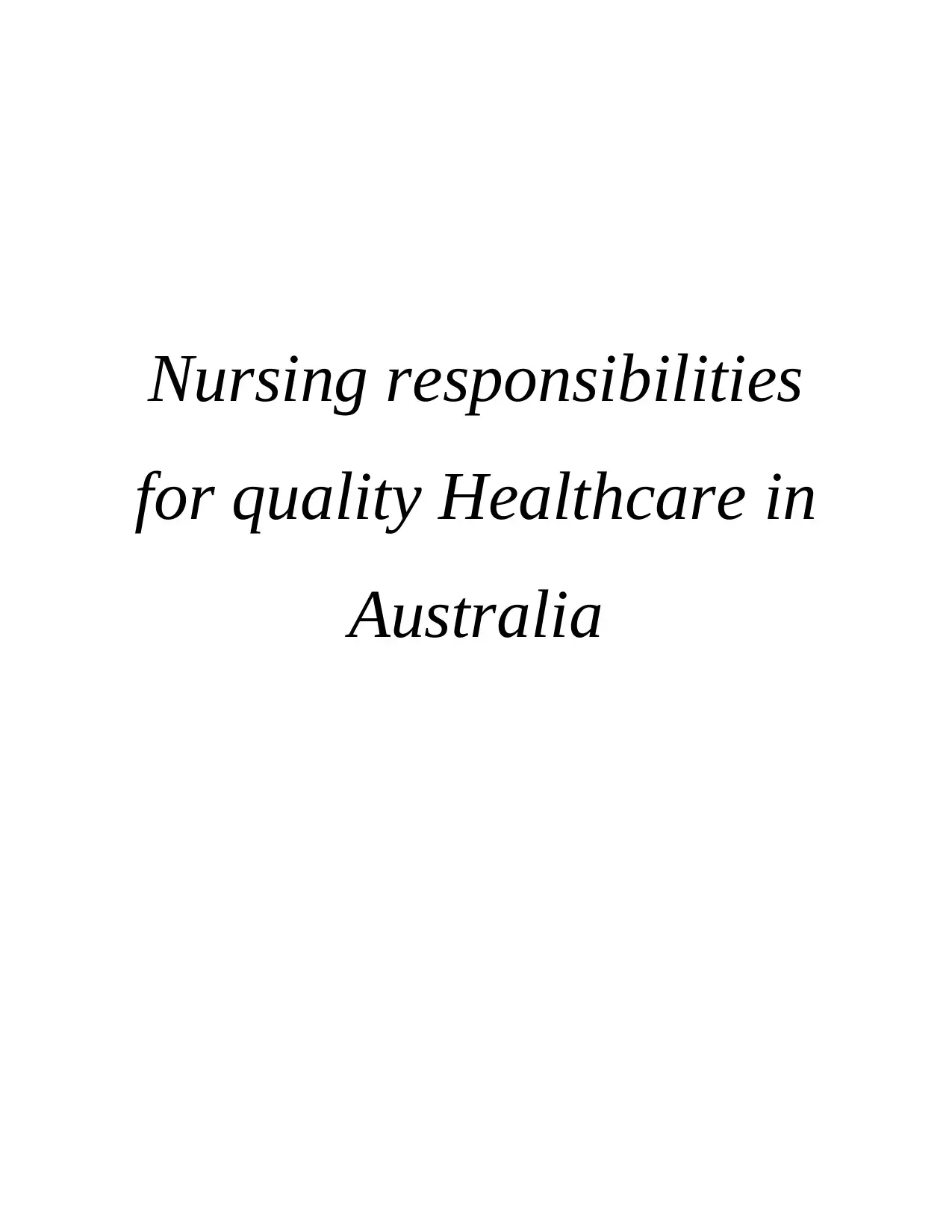
Nursing responsibilities
for quality Healthcare in
Australia
for quality Healthcare in
Australia
Paraphrase This Document
Need a fresh take? Get an instant paraphrase of this document with our AI Paraphraser
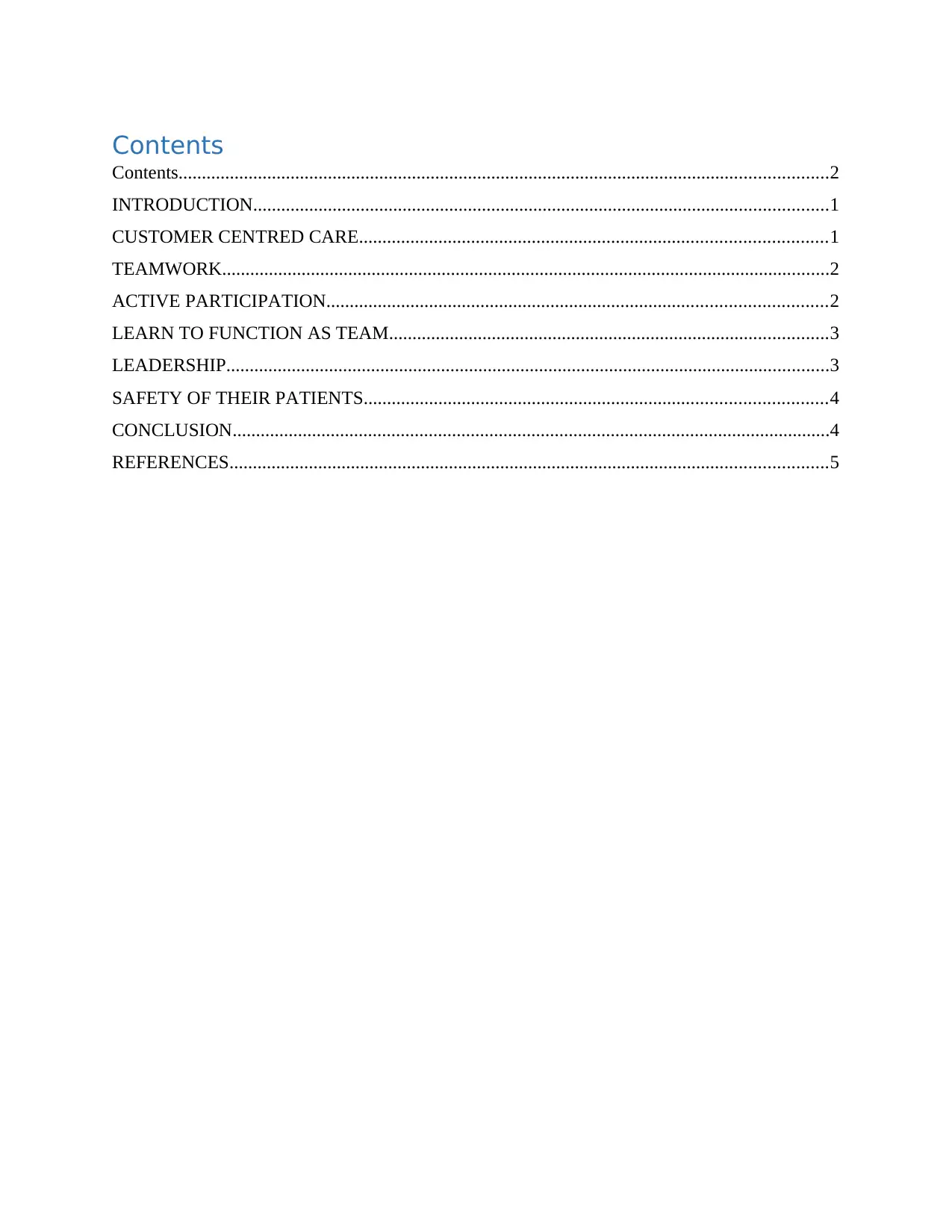
Contents
Contents...........................................................................................................................................2
INTRODUCTION...........................................................................................................................1
CUSTOMER CENTRED CARE....................................................................................................1
TEAMWORK..................................................................................................................................2
ACTIVE PARTICIPATION...........................................................................................................2
LEARN TO FUNCTION AS TEAM..............................................................................................3
LEADERSHIP.................................................................................................................................3
SAFETY OF THEIR PATIENTS...................................................................................................4
CONCLUSION................................................................................................................................4
REFERENCES................................................................................................................................5
Contents...........................................................................................................................................2
INTRODUCTION...........................................................................................................................1
CUSTOMER CENTRED CARE....................................................................................................1
TEAMWORK..................................................................................................................................2
ACTIVE PARTICIPATION...........................................................................................................2
LEARN TO FUNCTION AS TEAM..............................................................................................3
LEADERSHIP.................................................................................................................................3
SAFETY OF THEIR PATIENTS...................................................................................................4
CONCLUSION................................................................................................................................4
REFERENCES................................................................................................................................5

⊘ This is a preview!⊘
Do you want full access?
Subscribe today to unlock all pages.

Trusted by 1+ million students worldwide
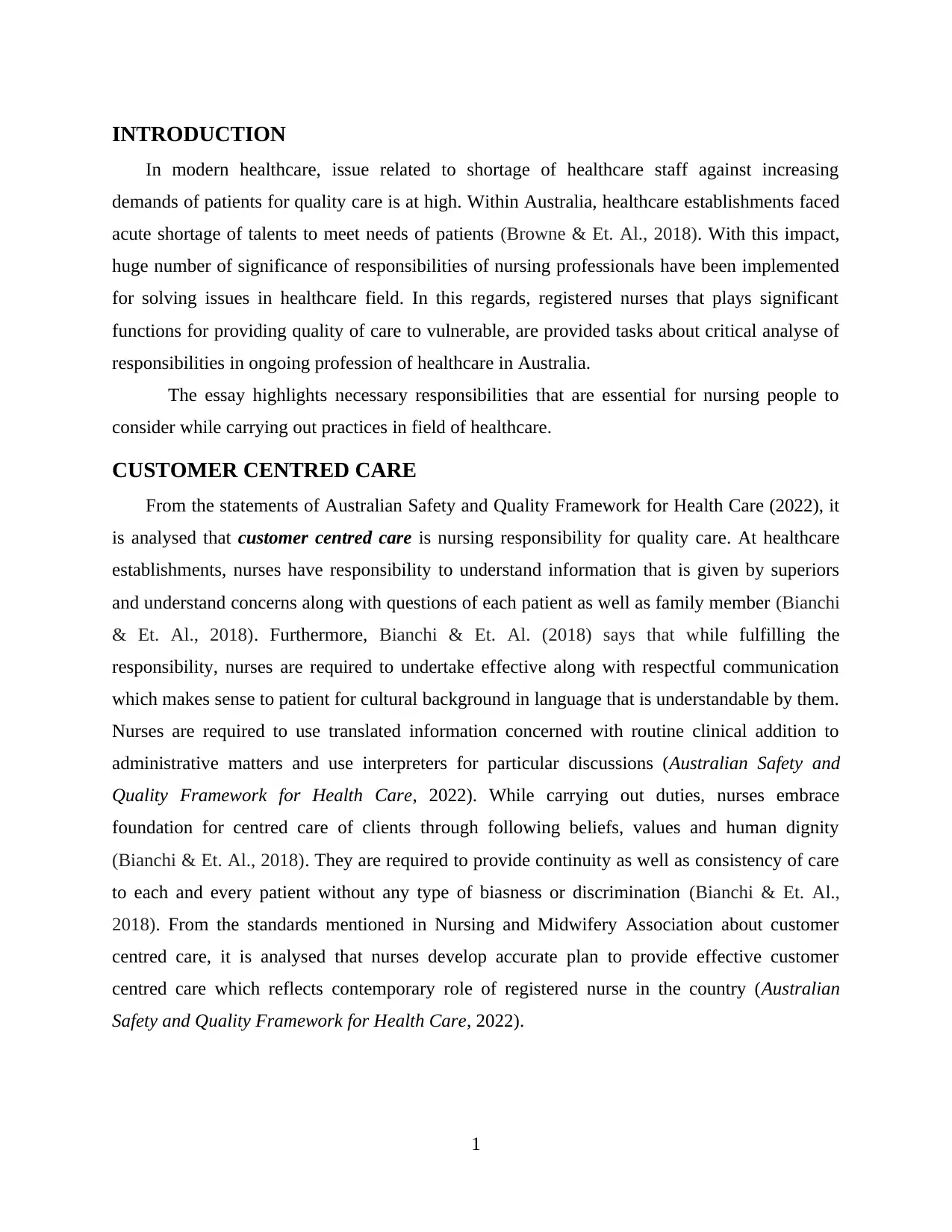
INTRODUCTION
In modern healthcare, issue related to shortage of healthcare staff against increasing
demands of patients for quality care is at high. Within Australia, healthcare establishments faced
acute shortage of talents to meet needs of patients (Browne & Et. Al., 2018). With this impact,
huge number of significance of responsibilities of nursing professionals have been implemented
for solving issues in healthcare field. In this regards, registered nurses that plays significant
functions for providing quality of care to vulnerable, are provided tasks about critical analyse of
responsibilities in ongoing profession of healthcare in Australia.
The essay highlights necessary responsibilities that are essential for nursing people to
consider while carrying out practices in field of healthcare.
CUSTOMER CENTRED CARE
From the statements of Australian Safety and Quality Framework for Health Care (2022), it
is analysed that customer centred care is nursing responsibility for quality care. At healthcare
establishments, nurses have responsibility to understand information that is given by superiors
and understand concerns along with questions of each patient as well as family member (Bianchi
& Et. Al., 2018). Furthermore, Bianchi & Et. Al. (2018) says that while fulfilling the
responsibility, nurses are required to undertake effective along with respectful communication
which makes sense to patient for cultural background in language that is understandable by them.
Nurses are required to use translated information concerned with routine clinical addition to
administrative matters and use interpreters for particular discussions (Australian Safety and
Quality Framework for Health Care, 2022). While carrying out duties, nurses embrace
foundation for centred care of clients through following beliefs, values and human dignity
(Bianchi & Et. Al., 2018). They are required to provide continuity as well as consistency of care
to each and every patient without any type of biasness or discrimination (Bianchi & Et. Al.,
2018). From the standards mentioned in Nursing and Midwifery Association about customer
centred care, it is analysed that nurses develop accurate plan to provide effective customer
centred care which reflects contemporary role of registered nurse in the country (Australian
Safety and Quality Framework for Health Care, 2022).
1
In modern healthcare, issue related to shortage of healthcare staff against increasing
demands of patients for quality care is at high. Within Australia, healthcare establishments faced
acute shortage of talents to meet needs of patients (Browne & Et. Al., 2018). With this impact,
huge number of significance of responsibilities of nursing professionals have been implemented
for solving issues in healthcare field. In this regards, registered nurses that plays significant
functions for providing quality of care to vulnerable, are provided tasks about critical analyse of
responsibilities in ongoing profession of healthcare in Australia.
The essay highlights necessary responsibilities that are essential for nursing people to
consider while carrying out practices in field of healthcare.
CUSTOMER CENTRED CARE
From the statements of Australian Safety and Quality Framework for Health Care (2022), it
is analysed that customer centred care is nursing responsibility for quality care. At healthcare
establishments, nurses have responsibility to understand information that is given by superiors
and understand concerns along with questions of each patient as well as family member (Bianchi
& Et. Al., 2018). Furthermore, Bianchi & Et. Al. (2018) says that while fulfilling the
responsibility, nurses are required to undertake effective along with respectful communication
which makes sense to patient for cultural background in language that is understandable by them.
Nurses are required to use translated information concerned with routine clinical addition to
administrative matters and use interpreters for particular discussions (Australian Safety and
Quality Framework for Health Care, 2022). While carrying out duties, nurses embrace
foundation for centred care of clients through following beliefs, values and human dignity
(Bianchi & Et. Al., 2018). They are required to provide continuity as well as consistency of care
to each and every patient without any type of biasness or discrimination (Bianchi & Et. Al.,
2018). From the standards mentioned in Nursing and Midwifery Association about customer
centred care, it is analysed that nurses develop accurate plan to provide effective customer
centred care which reflects contemporary role of registered nurse in the country (Australian
Safety and Quality Framework for Health Care, 2022).
1
Paraphrase This Document
Need a fresh take? Get an instant paraphrase of this document with our AI Paraphraser
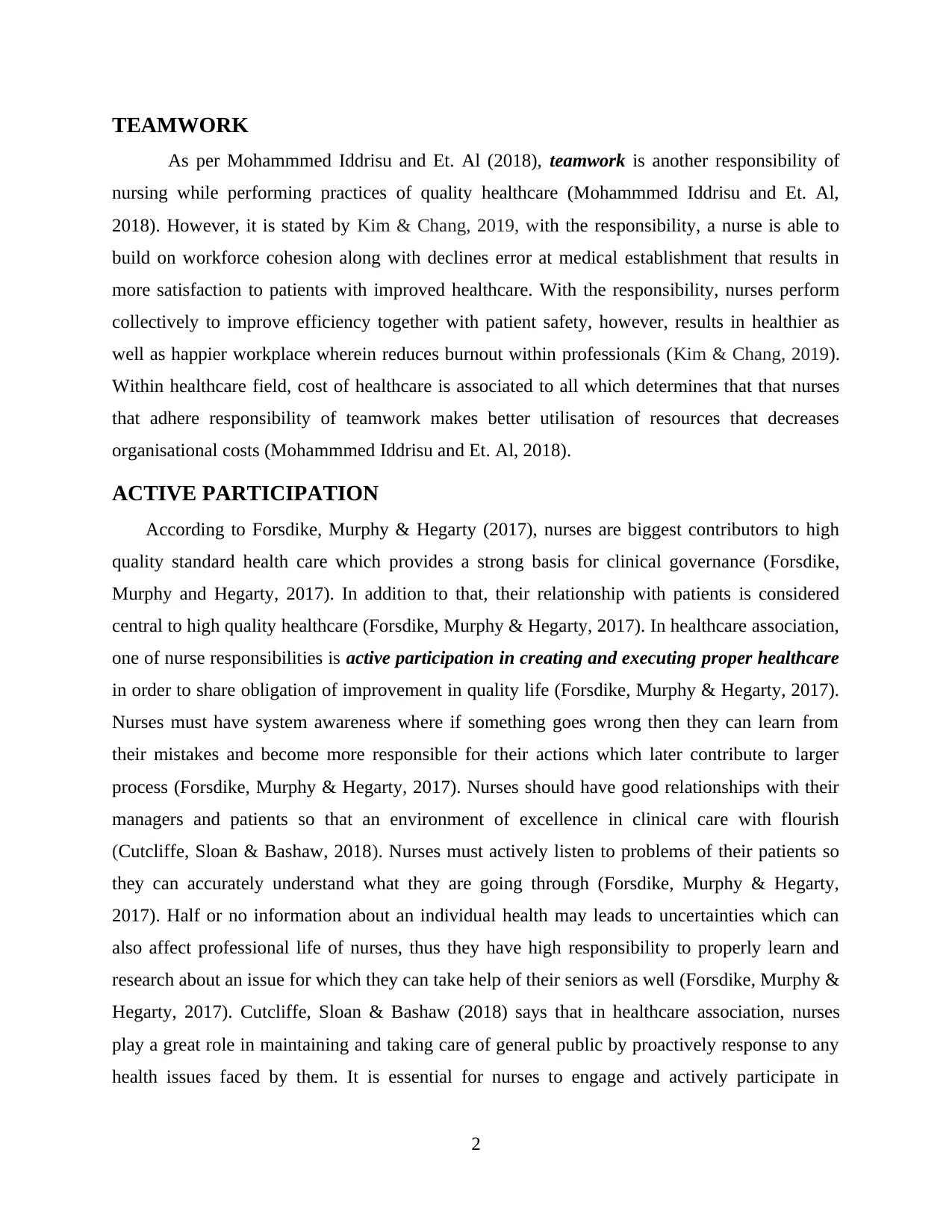
TEAMWORK
As per Mohammmed Iddrisu and Et. Al (2018), teamwork is another responsibility of
nursing while performing practices of quality healthcare (Mohammmed Iddrisu and Et. Al,
2018). However, it is stated by Kim & Chang, 2019, with the responsibility, a nurse is able to
build on workforce cohesion along with declines error at medical establishment that results in
more satisfaction to patients with improved healthcare. With the responsibility, nurses perform
collectively to improve efficiency together with patient safety, however, results in healthier as
well as happier workplace wherein reduces burnout within professionals (Kim & Chang, 2019).
Within healthcare field, cost of healthcare is associated to all which determines that that nurses
that adhere responsibility of teamwork makes better utilisation of resources that decreases
organisational costs (Mohammmed Iddrisu and Et. Al, 2018).
ACTIVE PARTICIPATION
According to Forsdike, Murphy & Hegarty (2017), nurses are biggest contributors to high
quality standard health care which provides a strong basis for clinical governance (Forsdike,
Murphy and Hegarty, 2017). In addition to that, their relationship with patients is considered
central to high quality healthcare (Forsdike, Murphy & Hegarty, 2017). In healthcare association,
one of nurse responsibilities is active participation in creating and executing proper healthcare
in order to share obligation of improvement in quality life (Forsdike, Murphy & Hegarty, 2017).
Nurses must have system awareness where if something goes wrong then they can learn from
their mistakes and become more responsible for their actions which later contribute to larger
process (Forsdike, Murphy & Hegarty, 2017). Nurses should have good relationships with their
managers and patients so that an environment of excellence in clinical care with flourish
(Cutcliffe, Sloan & Bashaw, 2018). Nurses must actively listen to problems of their patients so
they can accurately understand what they are going through (Forsdike, Murphy & Hegarty,
2017). Half or no information about an individual health may leads to uncertainties which can
also affect professional life of nurses, thus they have high responsibility to properly learn and
research about an issue for which they can take help of their seniors as well (Forsdike, Murphy &
Hegarty, 2017). Cutcliffe, Sloan & Bashaw (2018) says that in healthcare association, nurses
play a great role in maintaining and taking care of general public by proactively response to any
health issues faced by them. It is essential for nurses to engage and actively participate in
2
As per Mohammmed Iddrisu and Et. Al (2018), teamwork is another responsibility of
nursing while performing practices of quality healthcare (Mohammmed Iddrisu and Et. Al,
2018). However, it is stated by Kim & Chang, 2019, with the responsibility, a nurse is able to
build on workforce cohesion along with declines error at medical establishment that results in
more satisfaction to patients with improved healthcare. With the responsibility, nurses perform
collectively to improve efficiency together with patient safety, however, results in healthier as
well as happier workplace wherein reduces burnout within professionals (Kim & Chang, 2019).
Within healthcare field, cost of healthcare is associated to all which determines that that nurses
that adhere responsibility of teamwork makes better utilisation of resources that decreases
organisational costs (Mohammmed Iddrisu and Et. Al, 2018).
ACTIVE PARTICIPATION
According to Forsdike, Murphy & Hegarty (2017), nurses are biggest contributors to high
quality standard health care which provides a strong basis for clinical governance (Forsdike,
Murphy and Hegarty, 2017). In addition to that, their relationship with patients is considered
central to high quality healthcare (Forsdike, Murphy & Hegarty, 2017). In healthcare association,
one of nurse responsibilities is active participation in creating and executing proper healthcare
in order to share obligation of improvement in quality life (Forsdike, Murphy & Hegarty, 2017).
Nurses must have system awareness where if something goes wrong then they can learn from
their mistakes and become more responsible for their actions which later contribute to larger
process (Forsdike, Murphy & Hegarty, 2017). Nurses should have good relationships with their
managers and patients so that an environment of excellence in clinical care with flourish
(Cutcliffe, Sloan & Bashaw, 2018). Nurses must actively listen to problems of their patients so
they can accurately understand what they are going through (Forsdike, Murphy & Hegarty,
2017). Half or no information about an individual health may leads to uncertainties which can
also affect professional life of nurses, thus they have high responsibility to properly learn and
research about an issue for which they can take help of their seniors as well (Forsdike, Murphy &
Hegarty, 2017). Cutcliffe, Sloan & Bashaw (2018) says that in healthcare association, nurses
play a great role in maintaining and taking care of general public by proactively response to any
health issues faced by them. It is essential for nurses to engage and actively participate in
2
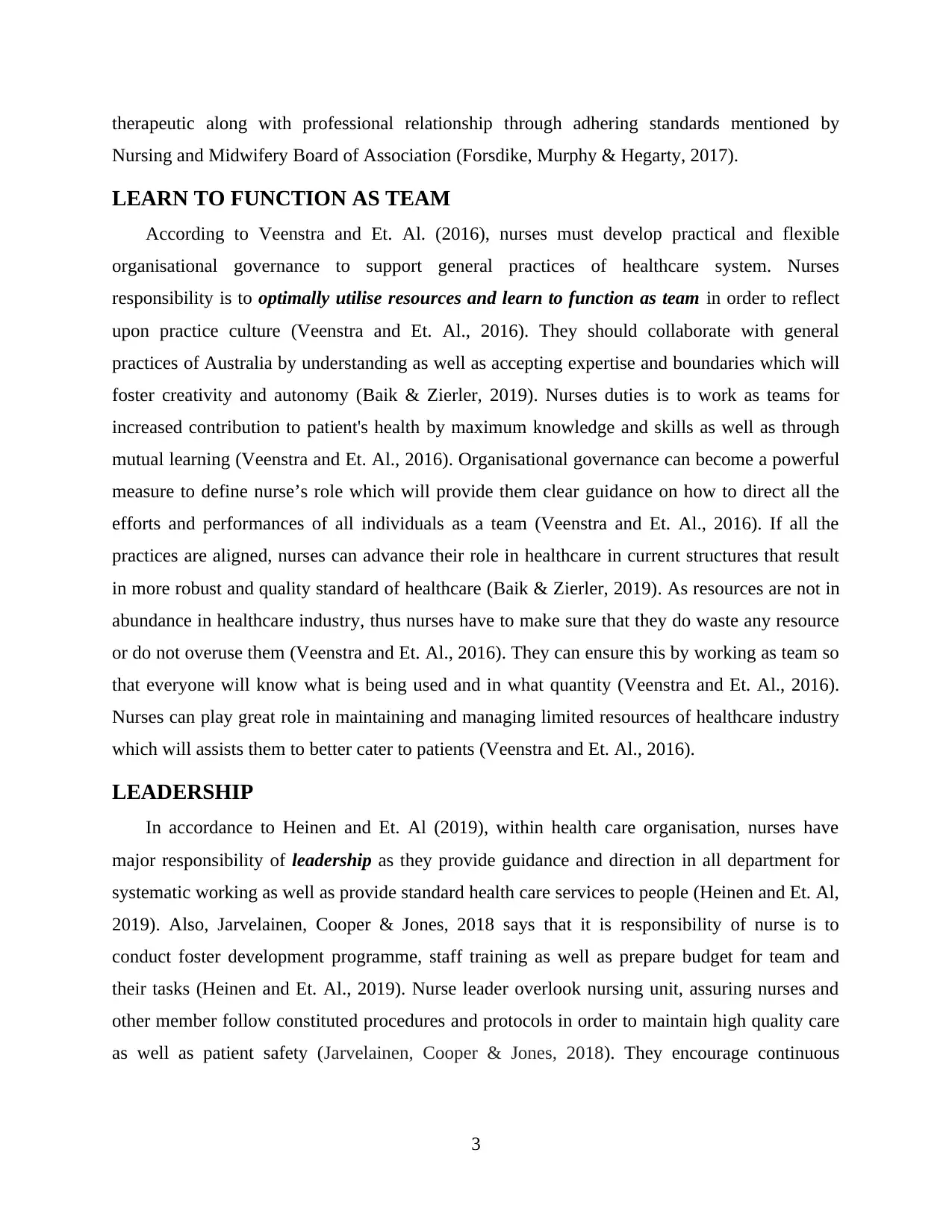
therapeutic along with professional relationship through adhering standards mentioned by
Nursing and Midwifery Board of Association (Forsdike, Murphy & Hegarty, 2017).
LEARN TO FUNCTION AS TEAM
According to Veenstra and Et. Al. (2016), nurses must develop practical and flexible
organisational governance to support general practices of healthcare system. Nurses
responsibility is to optimally utilise resources and learn to function as team in order to reflect
upon practice culture (Veenstra and Et. Al., 2016). They should collaborate with general
practices of Australia by understanding as well as accepting expertise and boundaries which will
foster creativity and autonomy (Baik & Zierler, 2019). Nurses duties is to work as teams for
increased contribution to patient's health by maximum knowledge and skills as well as through
mutual learning (Veenstra and Et. Al., 2016). Organisational governance can become a powerful
measure to define nurse’s role which will provide them clear guidance on how to direct all the
efforts and performances of all individuals as a team (Veenstra and Et. Al., 2016). If all the
practices are aligned, nurses can advance their role in healthcare in current structures that result
in more robust and quality standard of healthcare (Baik & Zierler, 2019). As resources are not in
abundance in healthcare industry, thus nurses have to make sure that they do waste any resource
or do not overuse them (Veenstra and Et. Al., 2016). They can ensure this by working as team so
that everyone will know what is being used and in what quantity (Veenstra and Et. Al., 2016).
Nurses can play great role in maintaining and managing limited resources of healthcare industry
which will assists them to better cater to patients (Veenstra and Et. Al., 2016).
LEADERSHIP
In accordance to Heinen and Et. Al (2019), within health care organisation, nurses have
major responsibility of leadership as they provide guidance and direction in all department for
systematic working as well as provide standard health care services to people (Heinen and Et. Al,
2019). Also, Jarvelainen, Cooper & Jones, 2018 says that it is responsibility of nurse is to
conduct foster development programme, staff training as well as prepare budget for team and
their tasks (Heinen and Et. Al., 2019). Nurse leader overlook nursing unit, assuring nurses and
other member follow constituted procedures and protocols in order to maintain high quality care
as well as patient safety (Jarvelainen, Cooper & Jones, 2018). They encourage continuous
3
Nursing and Midwifery Board of Association (Forsdike, Murphy & Hegarty, 2017).
LEARN TO FUNCTION AS TEAM
According to Veenstra and Et. Al. (2016), nurses must develop practical and flexible
organisational governance to support general practices of healthcare system. Nurses
responsibility is to optimally utilise resources and learn to function as team in order to reflect
upon practice culture (Veenstra and Et. Al., 2016). They should collaborate with general
practices of Australia by understanding as well as accepting expertise and boundaries which will
foster creativity and autonomy (Baik & Zierler, 2019). Nurses duties is to work as teams for
increased contribution to patient's health by maximum knowledge and skills as well as through
mutual learning (Veenstra and Et. Al., 2016). Organisational governance can become a powerful
measure to define nurse’s role which will provide them clear guidance on how to direct all the
efforts and performances of all individuals as a team (Veenstra and Et. Al., 2016). If all the
practices are aligned, nurses can advance their role in healthcare in current structures that result
in more robust and quality standard of healthcare (Baik & Zierler, 2019). As resources are not in
abundance in healthcare industry, thus nurses have to make sure that they do waste any resource
or do not overuse them (Veenstra and Et. Al., 2016). They can ensure this by working as team so
that everyone will know what is being used and in what quantity (Veenstra and Et. Al., 2016).
Nurses can play great role in maintaining and managing limited resources of healthcare industry
which will assists them to better cater to patients (Veenstra and Et. Al., 2016).
LEADERSHIP
In accordance to Heinen and Et. Al (2019), within health care organisation, nurses have
major responsibility of leadership as they provide guidance and direction in all department for
systematic working as well as provide standard health care services to people (Heinen and Et. Al,
2019). Also, Jarvelainen, Cooper & Jones, 2018 says that it is responsibility of nurse is to
conduct foster development programme, staff training as well as prepare budget for team and
their tasks (Heinen and Et. Al., 2019). Nurse leader overlook nursing unit, assuring nurses and
other member follow constituted procedures and protocols in order to maintain high quality care
as well as patient safety (Jarvelainen, Cooper & Jones, 2018). They encourage continuous
3
⊘ This is a preview!⊘
Do you want full access?
Subscribe today to unlock all pages.

Trusted by 1+ million students worldwide
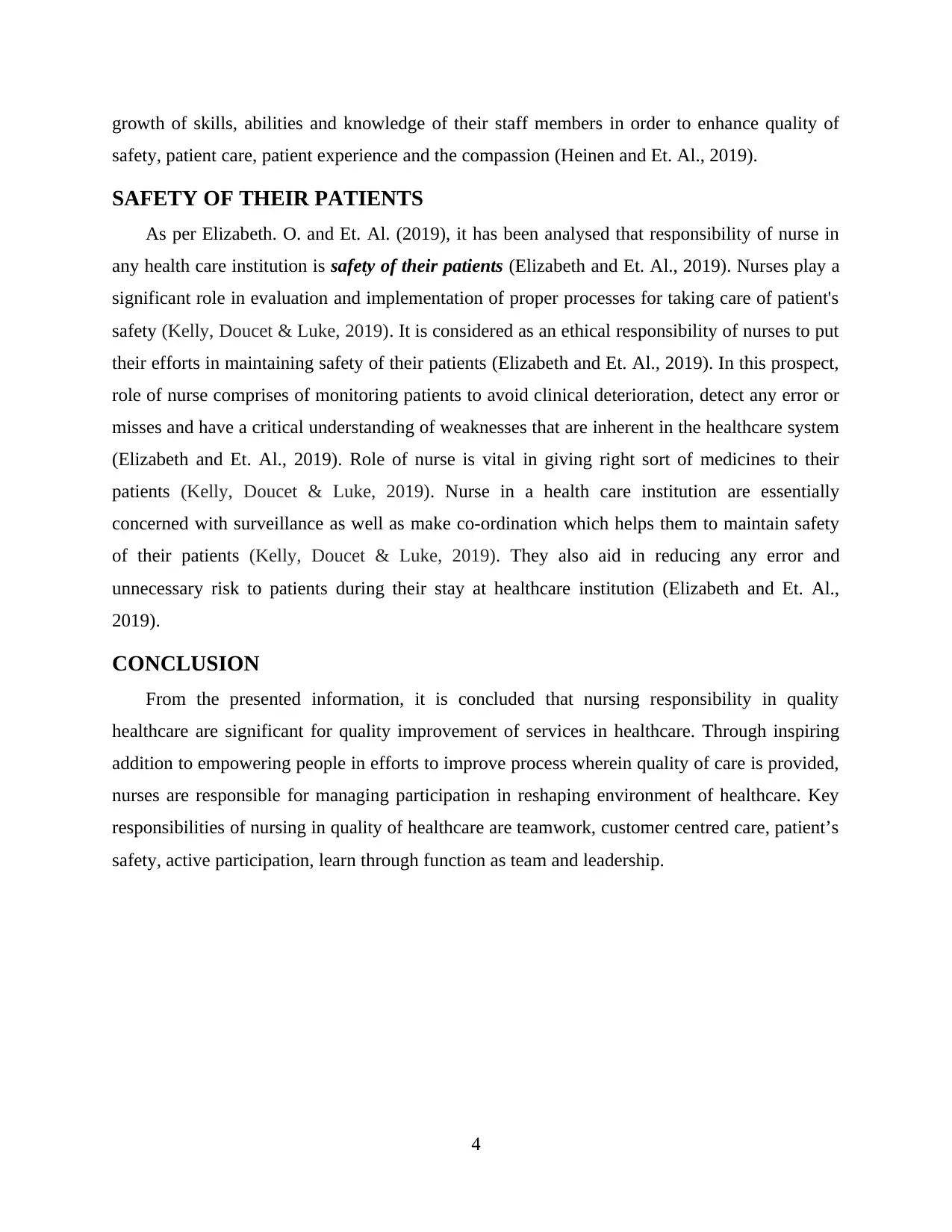
growth of skills, abilities and knowledge of their staff members in order to enhance quality of
safety, patient care, patient experience and the compassion (Heinen and Et. Al., 2019).
SAFETY OF THEIR PATIENTS
As per Elizabeth. O. and Et. Al. (2019), it has been analysed that responsibility of nurse in
any health care institution is safety of their patients (Elizabeth and Et. Al., 2019). Nurses play a
significant role in evaluation and implementation of proper processes for taking care of patient's
safety (Kelly, Doucet & Luke, 2019). It is considered as an ethical responsibility of nurses to put
their efforts in maintaining safety of their patients (Elizabeth and Et. Al., 2019). In this prospect,
role of nurse comprises of monitoring patients to avoid clinical deterioration, detect any error or
misses and have a critical understanding of weaknesses that are inherent in the healthcare system
(Elizabeth and Et. Al., 2019). Role of nurse is vital in giving right sort of medicines to their
patients (Kelly, Doucet & Luke, 2019). Nurse in a health care institution are essentially
concerned with surveillance as well as make co-ordination which helps them to maintain safety
of their patients (Kelly, Doucet & Luke, 2019). They also aid in reducing any error and
unnecessary risk to patients during their stay at healthcare institution (Elizabeth and Et. Al.,
2019).
CONCLUSION
From the presented information, it is concluded that nursing responsibility in quality
healthcare are significant for quality improvement of services in healthcare. Through inspiring
addition to empowering people in efforts to improve process wherein quality of care is provided,
nurses are responsible for managing participation in reshaping environment of healthcare. Key
responsibilities of nursing in quality of healthcare are teamwork, customer centred care, patient’s
safety, active participation, learn through function as team and leadership.
4
safety, patient care, patient experience and the compassion (Heinen and Et. Al., 2019).
SAFETY OF THEIR PATIENTS
As per Elizabeth. O. and Et. Al. (2019), it has been analysed that responsibility of nurse in
any health care institution is safety of their patients (Elizabeth and Et. Al., 2019). Nurses play a
significant role in evaluation and implementation of proper processes for taking care of patient's
safety (Kelly, Doucet & Luke, 2019). It is considered as an ethical responsibility of nurses to put
their efforts in maintaining safety of their patients (Elizabeth and Et. Al., 2019). In this prospect,
role of nurse comprises of monitoring patients to avoid clinical deterioration, detect any error or
misses and have a critical understanding of weaknesses that are inherent in the healthcare system
(Elizabeth and Et. Al., 2019). Role of nurse is vital in giving right sort of medicines to their
patients (Kelly, Doucet & Luke, 2019). Nurse in a health care institution are essentially
concerned with surveillance as well as make co-ordination which helps them to maintain safety
of their patients (Kelly, Doucet & Luke, 2019). They also aid in reducing any error and
unnecessary risk to patients during their stay at healthcare institution (Elizabeth and Et. Al.,
2019).
CONCLUSION
From the presented information, it is concluded that nursing responsibility in quality
healthcare are significant for quality improvement of services in healthcare. Through inspiring
addition to empowering people in efforts to improve process wherein quality of care is provided,
nurses are responsible for managing participation in reshaping environment of healthcare. Key
responsibilities of nursing in quality of healthcare are teamwork, customer centred care, patient’s
safety, active participation, learn through function as team and leadership.
4
Paraphrase This Document
Need a fresh take? Get an instant paraphrase of this document with our AI Paraphraser
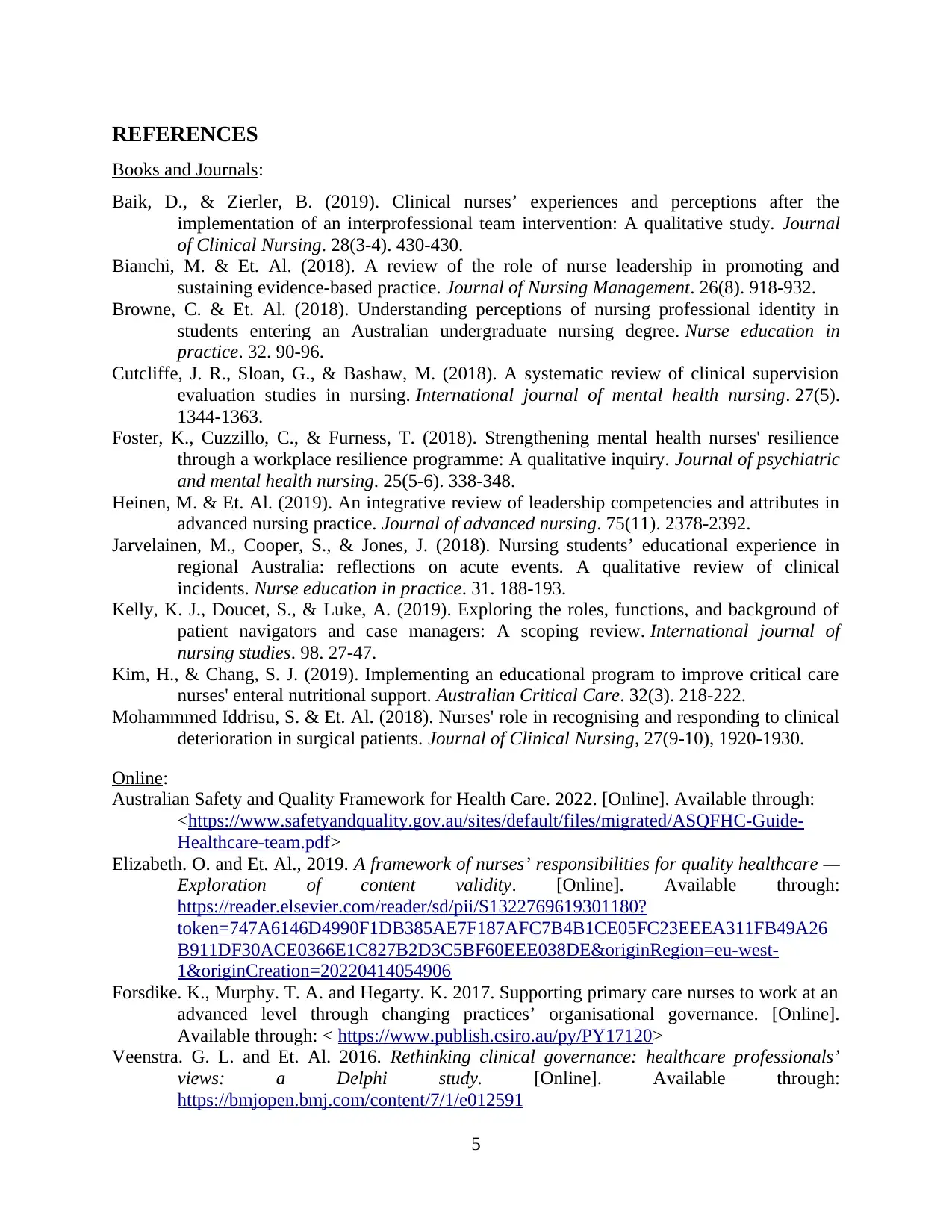
REFERENCES
Books and Journals:
Baik, D., & Zierler, B. (2019). Clinical nurses’ experiences and perceptions after the
implementation of an interprofessional team intervention: A qualitative study. Journal
of Clinical Nursing. 28(3-4). 430-430.
Bianchi, M. & Et. Al. (2018). A review of the role of nurse leadership in promoting and
sustaining evidence‐based practice. Journal of Nursing Management. 26(8). 918-932.
Browne, C. & Et. Al. (2018). Understanding perceptions of nursing professional identity in
students entering an Australian undergraduate nursing degree. Nurse education in
practice. 32. 90-96.
Cutcliffe, J. R., Sloan, G., & Bashaw, M. (2018). A systematic review of clinical supervision
evaluation studies in nursing. International journal of mental health nursing. 27(5).
1344-1363.
Foster, K., Cuzzillo, C., & Furness, T. (2018). Strengthening mental health nurses' resilience
through a workplace resilience programme: A qualitative inquiry. Journal of psychiatric
and mental health nursing. 25(5-6). 338-348.
Heinen, M. & Et. Al. (2019). An integrative review of leadership competencies and attributes in
advanced nursing practice. Journal of advanced nursing. 75(11). 2378-2392.
Jarvelainen, M., Cooper, S., & Jones, J. (2018). Nursing students’ educational experience in
regional Australia: reflections on acute events. A qualitative review of clinical
incidents. Nurse education in practice. 31. 188-193.
Kelly, K. J., Doucet, S., & Luke, A. (2019). Exploring the roles, functions, and background of
patient navigators and case managers: A scoping review. International journal of
nursing studies. 98. 27-47.
Kim, H., & Chang, S. J. (2019). Implementing an educational program to improve critical care
nurses' enteral nutritional support. Australian Critical Care. 32(3). 218-222.
Mohammmed Iddrisu, S. & Et. Al. (2018). Nurses' role in recognising and responding to clinical
deterioration in surgical patients. Journal of Clinical Nursing, 27(9-10), 1920-1930.
Online:
Australian Safety and Quality Framework for Health Care. 2022. [Online]. Available through:
<https://www.safetyandquality.gov.au/sites/default/files/migrated/ASQFHC-Guide-
Healthcare-team.pdf>
Elizabeth. O. and Et. Al., 2019. A framework of nurses’ responsibilities for quality healthcare —
Exploration of content validity. [Online]. Available through:
https://reader.elsevier.com/reader/sd/pii/S1322769619301180?
token=747A6146D4990F1DB385AE7F187AFC7B4B1CE05FC23EEEA311FB49A26
B911DF30ACE0366E1C827B2D3C5BF60EEE038DE&originRegion=eu-west-
1&originCreation=20220414054906
Forsdike. K., Murphy. T. A. and Hegarty. K. 2017. Supporting primary care nurses to work at an
advanced level through changing practices’ organisational governance. [Online].
Available through: < https://www.publish.csiro.au/py/PY17120>
Veenstra. G. L. and Et. Al. 2016. Rethinking clinical governance: healthcare professionals’
views: a Delphi study. [Online]. Available through:
https://bmjopen.bmj.com/content/7/1/e012591
5
Books and Journals:
Baik, D., & Zierler, B. (2019). Clinical nurses’ experiences and perceptions after the
implementation of an interprofessional team intervention: A qualitative study. Journal
of Clinical Nursing. 28(3-4). 430-430.
Bianchi, M. & Et. Al. (2018). A review of the role of nurse leadership in promoting and
sustaining evidence‐based practice. Journal of Nursing Management. 26(8). 918-932.
Browne, C. & Et. Al. (2018). Understanding perceptions of nursing professional identity in
students entering an Australian undergraduate nursing degree. Nurse education in
practice. 32. 90-96.
Cutcliffe, J. R., Sloan, G., & Bashaw, M. (2018). A systematic review of clinical supervision
evaluation studies in nursing. International journal of mental health nursing. 27(5).
1344-1363.
Foster, K., Cuzzillo, C., & Furness, T. (2018). Strengthening mental health nurses' resilience
through a workplace resilience programme: A qualitative inquiry. Journal of psychiatric
and mental health nursing. 25(5-6). 338-348.
Heinen, M. & Et. Al. (2019). An integrative review of leadership competencies and attributes in
advanced nursing practice. Journal of advanced nursing. 75(11). 2378-2392.
Jarvelainen, M., Cooper, S., & Jones, J. (2018). Nursing students’ educational experience in
regional Australia: reflections on acute events. A qualitative review of clinical
incidents. Nurse education in practice. 31. 188-193.
Kelly, K. J., Doucet, S., & Luke, A. (2019). Exploring the roles, functions, and background of
patient navigators and case managers: A scoping review. International journal of
nursing studies. 98. 27-47.
Kim, H., & Chang, S. J. (2019). Implementing an educational program to improve critical care
nurses' enteral nutritional support. Australian Critical Care. 32(3). 218-222.
Mohammmed Iddrisu, S. & Et. Al. (2018). Nurses' role in recognising and responding to clinical
deterioration in surgical patients. Journal of Clinical Nursing, 27(9-10), 1920-1930.
Online:
Australian Safety and Quality Framework for Health Care. 2022. [Online]. Available through:
<https://www.safetyandquality.gov.au/sites/default/files/migrated/ASQFHC-Guide-
Healthcare-team.pdf>
Elizabeth. O. and Et. Al., 2019. A framework of nurses’ responsibilities for quality healthcare —
Exploration of content validity. [Online]. Available through:
https://reader.elsevier.com/reader/sd/pii/S1322769619301180?
token=747A6146D4990F1DB385AE7F187AFC7B4B1CE05FC23EEEA311FB49A26
B911DF30ACE0366E1C827B2D3C5BF60EEE038DE&originRegion=eu-west-
1&originCreation=20220414054906
Forsdike. K., Murphy. T. A. and Hegarty. K. 2017. Supporting primary care nurses to work at an
advanced level through changing practices’ organisational governance. [Online].
Available through: < https://www.publish.csiro.au/py/PY17120>
Veenstra. G. L. and Et. Al. 2016. Rethinking clinical governance: healthcare professionals’
views: a Delphi study. [Online]. Available through:
https://bmjopen.bmj.com/content/7/1/e012591
5

6
⊘ This is a preview!⊘
Do you want full access?
Subscribe today to unlock all pages.

Trusted by 1+ million students worldwide
1 out of 9
Related Documents
Your All-in-One AI-Powered Toolkit for Academic Success.
+13062052269
info@desklib.com
Available 24*7 on WhatsApp / Email
![[object Object]](/_next/static/media/star-bottom.7253800d.svg)
Unlock your academic potential
Copyright © 2020–2026 A2Z Services. All Rights Reserved. Developed and managed by ZUCOL.





